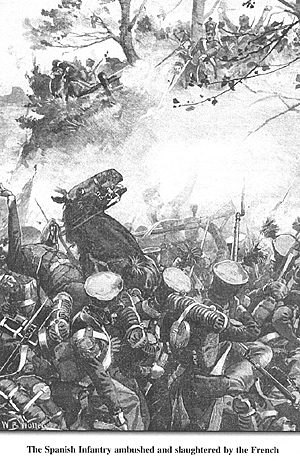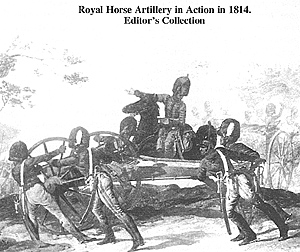Soult's Last Stand
Toulouse 1814
The Heroic KGL and Rockets
by Leon Parte, France
| |
The bridge here, beyond the French right, had been strongly barricaded with barrels, filled with earth, and the 22nd Chasseurs à Cheval lined the barrier with loaded carbines, shouting derisively as the Hanoverians rode up. The squadron halted; several men swung out of their saddles and walked up to the bridge; the carbines whistled, but the dismounted men paid no heed, and in a few minutes had torn down enough casks to let Poten in at the head of the others. When the squadron came back again their sabres were dripping, and the bridge was taken! Meantime, Beresford's three columns had pursued its deadly march along the foot of the heights until its rear had passed the Lavaur road, which led between the platforms to the suburbs of Toulouse, and then, in accordance with Wellington's orders, the two divisions wheeled into line to attack St. Sypière. What says Wilson's journal?
"The second rocket thrown went through the body of a horse, and left two men on the road! Just as they retired, a column of infantry came down another road near to us, beating their drums and seeming very determined; but on our again wheeling up into line they halted and commenced a running fire, by which no harm done. "Colonel Henderson was shot through the coat. We returned the salute by a regular volley; as soon as the smoke cleared away, and while the men were loading, I could see the French commander's horse lying down in the road and six or eight men carrying the unfortunate colonel's body off. They put about immediately, and we, having given them five or six rounds as they were going, followed them up the hill in three lines, ourselves in the front, the Portuguese in the second, and left Brigade the third." "The hill was so steep, and the road running through it over which we had to pass, that I was glad to lay hold of a sergeant's pike to help me up. They kept up a smart fire upon us. The right-hand man of my company was shot through the breast, and fell at my feet (he recovered and joined in about six afterwards). When we had cleared the hill (for the enemy flew before us), we came in sight of their whole army and of the town of Toulouse, a noble sight." The Rocket brigade's action was also recorded by John Spencer Cooper of the 7thFoot:
“Some time therefore was lost before our guns and cavalry came up, and before we arrived at the post assigned to our division, a large body of dragoons posted on the high road between two hills, seemed inclined to make a dash at us; but the rocket brigade joining us at the time they were about to charge, stopped them. The first rocket fired, went right into their column, and sent them scampering back. “Looking round, I was glad to see that our dragoons, having passed the narrow bridge of Croix d'Orade, were coming up at a gallop…" So much for the present for the 4th Division. Their comrades of the 6th, upon whom more brunt of fighting fell, found a mass of infantry about to descend from the hill, while a strong body of horse trotted down the road to intercept any retreat. The whole of Beresford's command -- which at the outset had not mustered 13,000, and which had suffered severely on its march - was hemmed in to a narrow difficult position, the enemy strongly entrenched above them, an unfordable river in their rear, Berton menacing the left flank and Vial the right! Soult, up on the rocky hill, had brought Taupin and D'Armagnac up to reinforce the rest -the latter general himself a native of Toulouse -- and, after some stirring words to Taupin, ordered them to descend with fury! Unfortunately for themselves, they waited and gave Beresford time to wheel into line. The French were met with Congreve rockets as they came shouting down, and part of the 6th Division repulsing Vial in square while the 4th Division behaved as already narrated, the tables were completely turned, and instead of an utter annihilation of the little red mass below, that mass followed up its first successes by mounting the hill, drove the French before it, and half of these formidable heights were taken. The French infantry ran in the greatest confusion says the journal,
The town mentioned by the captain was evidently the suburb of Guillemerie, immediately below the heights, where a bridge crosses the canal to the suburb of St. Etienne. At about this time, the 18th Hussars and the 1st King's German Legion Hussars came around the south end of St. Sypière to menace another bridge, known as the Demoiselles. Soult's position grew critical.
Sheltered from the fire under the hill, Pack's Scottish Brigade and Douglas's Portuguese swarmed up the steep banks, wheeled to their left by wings as they got out of the hollow road, and charged. In a few minutes, despite a storm of shot and shell at close quarters, the 42nd (Black Watch) and 79th Highlanders were soon masters of all the breastworks and in possession of the Colombette and Calvinet redoubts. The gallant Harispe launched a fearsome counterattack upon Pack's brigade, with such overwhelming numbers that they killed or slew or wounded four-fifths of the Black Watch, and cleared the captured works. An eyewitness has left us an account, which though often quoted will well bear repetition, of how the French came down like a torrent, darkening the whole hilltop, officers riding in front waving their men on with hat in hand;
“Then in that moment of mad suspense, half in defiance, half in admiration, their voices hoarse with the lust of slaughter, the Highlanders took off their feather bonnets, giving three British cheers as they waved the ostrich-plumes in the sunlight! And, when the redoubt was retaken for we did retake it, helped by the 11th and 91st there were only ninety of the 42nd left out of five hundred who went into action! “With dogged resolve our men stuck to the summit of the hill, a weak line facing terrible odds, and yet it was the kind of conflict they had learned to love in that war whose last battle they were then fighting!” They kept the Calvinet, and later on the Cameron Highlanders (79th) -- there were only sixty-three of that name in the regiment, strangely enough -- retook the Colombette. Harispe was down, and at about 4.30pm the French withdrew from the ridge; Soult retiring behind the canal somewhere around 5.00pm, beaten, yet still able and ready to renew the combat. Happily for human life, he thought better of it, retreating in admirable order on the night of the 11th , further hostilities being suspended a few days later by news of Napoleon's abdication Had it arrived before, five generals and 3,000 men on the French side, and four generals with close on 5,000 men on the Allied would have been spared. SourcesJournal of Captain, J. A. Wilson 2nd (Queen's Foot)
Soult's Last Stand Toulouse 1814
Well done, the Eighteenth... The Heroic KGL and Rockets Order of Battle: Soult Order of Battle: Wellington Back to Table of Contents -- First Empire #66 Back to First Empire List of Issues Back to MagWeb Master Magazine List © Copyright 2002 by First Empire. This article appears in MagWeb (Magazine Web) on the Internet World Wide Web. Other military history articles and gaming articles are available at http://www.magweb.com |
 The other by the 1st King's German Legion Hussars led by Colonel Poten,
was a glorious and praiseworthy charge at Montraudon.
The other by the 1st King's German Legion Hussars led by Colonel Poten,
was a glorious and praiseworthy charge at Montraudon.
 Beresford's artillery, which had been fiing against the Calvinet platform, was
brought up through the marshes at about 2.00pm. The Horse Artillery had arrived
earlier but without ammunition wagons and only seven or eight rounds of
ammunition; about half an hour later the 6th Division made a furious attack.
Beresford's artillery, which had been fiing against the Calvinet platform, was
brought up through the marshes at about 2.00pm. The Horse Artillery had arrived
earlier but without ammunition wagons and only seven or eight rounds of
ammunition; about half an hour later the 6th Division made a furious attack.